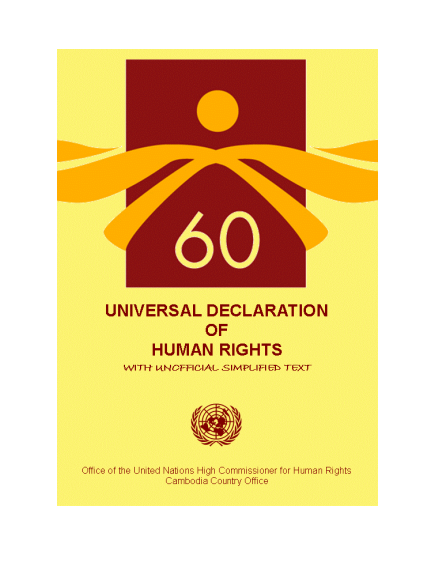
Universal Declaration of Human Rights
Publication Year: / Sources: Office of the United Nations High Commissioner for Human Rights in CambodiaThe Universal Declaration of Human Rights was adopted by the United Nations General Assembly on 10 December 1948. The General Assembly proclaimed the Universal Declaration as a “common standard of achievement for all peoples and all nations”.
Download: English | Khmer
Getting Away With It: The Treatment of Rape in Cambodia’s Justice System
Publication Year: 2015 / Sources: Cambodian League for the Promotion and Defense of Human Rights (LICADHO)This report is based on an analysis of data on rape cases gathered by LICADHO during the last three years. It reveals serious and systemic flaws in the prosecution of rape cases resulting in a disturbingly low number of convictions.
Download: English | Khmer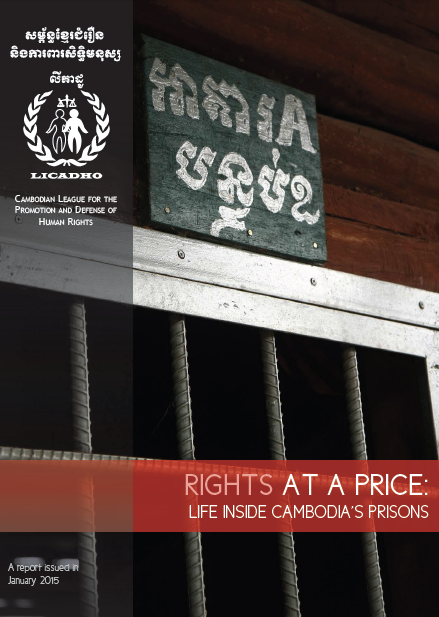
Rights at a price: Life Inside Cambodia’s Prisons
Publication Year: 2015 / Sources: Cambodian League for the Promotion and Defense of Human Rights (LICADHOThe role of Cambodia’s General Department of Prisons (GDP) is to confine prisoners in a safe, secure, hygienic and humane environment which permits rehabilitation in order that they may return to society to lead meaningful lives. Whilst these principles are commendable, they do not reflect the reality of life for the majority of inmates in Cambodian prisons.
Download: English | Khmer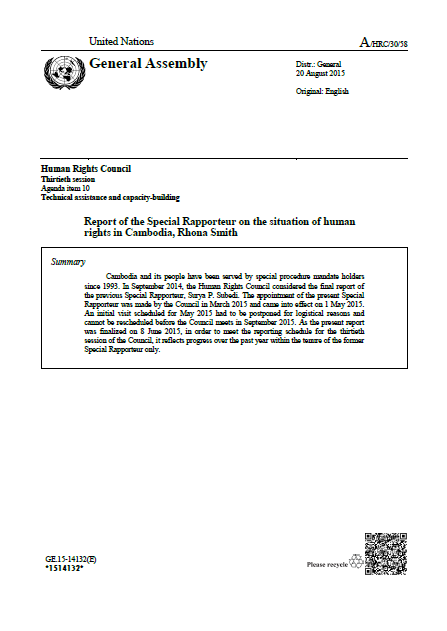
Report of the Special Rapporteur on the situation of human rights in Cambodia, Rhona Smith
Publication Year: 2015 / Sources: Office of the United Nations High Commissioner for Human Rights in Cambodia (OHCHR)Cambodia and its people have been served by special procedure mandate holders since 1993. In September 2014, the Human Rights Council considered the final report of the previous Special Rapporteur, Surya P. Subedi. The appointment of the present Special Rapporteur was made by the Council in March 2015 and came into effect on 1 May 2015.
Download: English | Khmer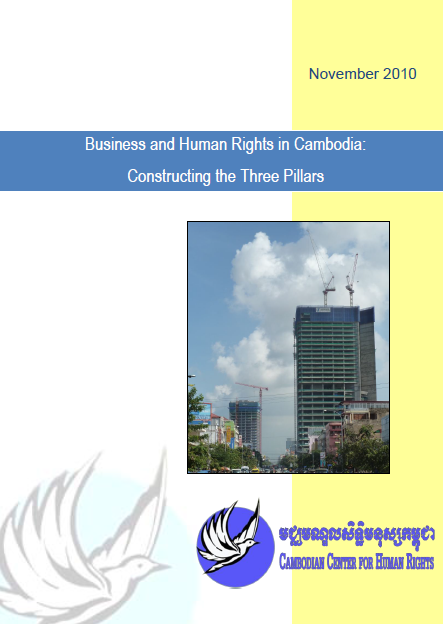
Business and Human Rights in Cambodia: Constructing the Three Pillars
Publication Year: 2010 / Sources: Cambodian Center for Human RightsThis report analyzes business and human rights in Cambodia through Ruggie’s framework and does so by focusing on land rights, labor rights, and the freedoms of expression, assembly and association in particular. These are the most critical rights issues relevant to businesses in the Cambodian context.
Download: English | Khmer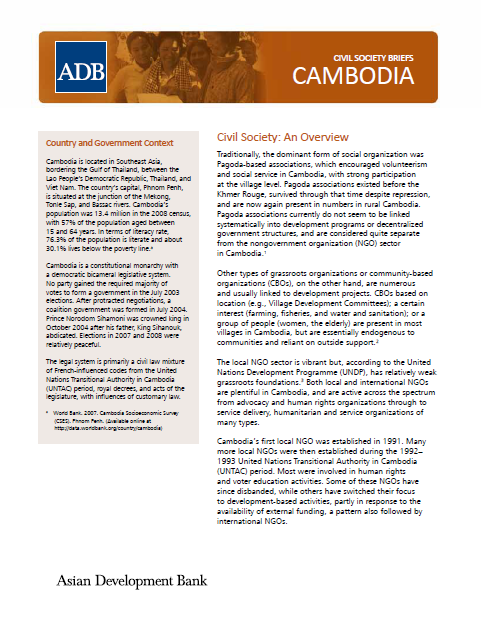
Civil Society Briefs: Cambodia
Publication Year: 2011 / Sources: Asian Development Bank (ADB)International and local NGOs play a major role in providing or supporting basic social services, often in remote areas and communities, and are present in every province and major sector in Cambodia. NGOs also bring alternative models and approaches to development—emphasizing participation, equity, gender sensitivity, and environmental sustainability.
Download: English | Khmer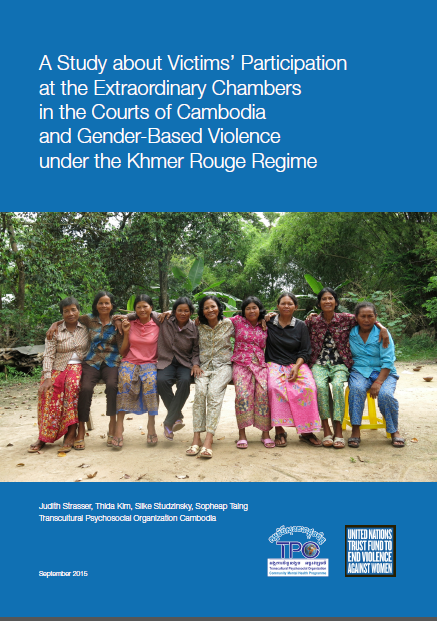
A Study about Victims’ Participation at the Extraordinary Chambers in the Courts of Cambodia and Gender-Based Violence under the Khmer Rouge Regime
Publication Year: 2015 / Sources: Transcultural Psychosocial Organization Cambodia (TPO)Under Khmer Rouge rule (1975-1979), one of the most brutal regimes in world history was unleashed. It subjected the Cambodian population to forced transfer and evacuation, forced labor, torture, imprisonment and execution. An estimated 1.5 million – a quarter of the then population – died under the regime from execution, overwork or starvation. Whilst such atrocities are well documented, comparatively little research has been undertaken into the gender-based violence that occurred
Download: English | Khmer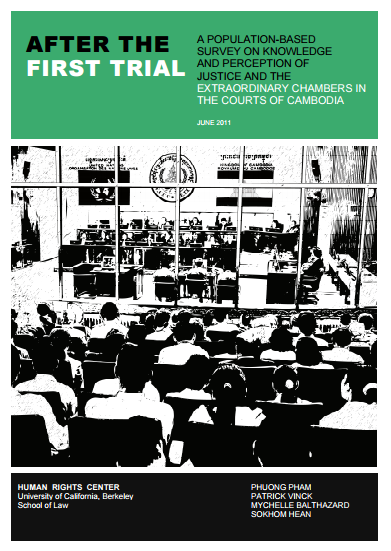
After the First Trial: A Population-Based Survey on Knowledge and Perceptions of Justice and the Extraordinary Chambers in the Courts of Cambodia
Publication Year: 2011 / Sources: Human Rights Center, University of California, BerkeleyOn July 26, 2010, Kaing Guek Eav, alias Duch, was convicted of crimes against humanity and grave breaches of the 1949 Geneva Conventions for events that took place three decades earlier under the Khmer Rouge regime. Following this important milestone for the Extraordinary Chambers in the Courts of Cambodia (ECCC), the present study was implemented to (1) monitor public awareness and knowledge of the ECCC’s work, (2) assess attitudes about justice and the desire for reparations for past crimes, and (3) recommend ways in which the ECCC, civil society, and the international community can continue to engage Cambodians in the work of the ECCC.
Download: English | Khmer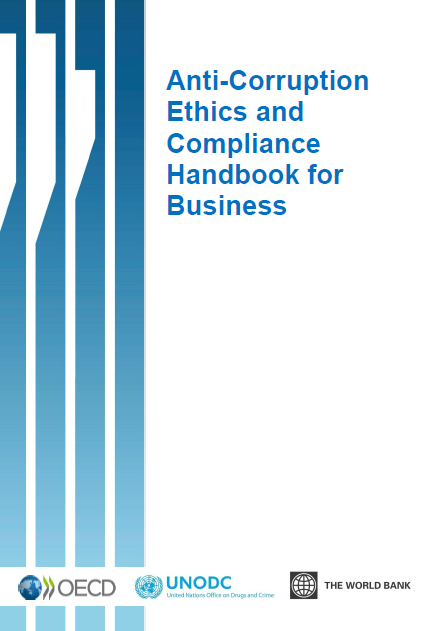
Anti-Corruption Ethics and Compliance Handbook for Business
Publication Year: 2013 / Sources: Organisation for Economic Co-operation and Development (OECD), United Nations Office on Drugs and Crime (UNODC), and the World BankThe primary objective of the corruption risk assessment is to better understand the risk exposure so that informed risk management decisions may be taken. A structured approach for how enterprises could conduct an anti corruption risk assessment is outlined in the steps below. Readers should note that each enterprise’s own risk assessment exercise is unique, depending on that enterprise’s industry, size, location, etc.
Download: English | Khmer
Mothers Behind Bars: The Impact of Detention on Women and Their Children
Publication Year: 2015 / Sources: Cambodian League for the Promotion and Defense of Human Rights (LICADHO)This report presents the findings of the research, giving concrete examples of the harmful implications of unnecessary detention on imprisoned women and their children. LICADHO’s findings demonstrate that by simply
reducing the numbers of mothers in detention authorities can dramatically improve the lives of many children.
